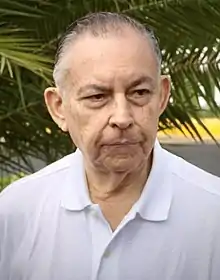Carlos Tünnerman | |
|---|---|
 Tünnerman in 2013 | |
| Minister of Education | |
| In office 1979–1984 | |
| Ambassador | |
| In office 1984–1988 | |
Carlos Tünnerman Bernheim (born May 10, 1933) is a Nicaraguan lawyer, diplomat, government official and educator. He is a former Minister of Education in Nicaragua, serving during the Sandinista National Liberation Front (FSLN) government from 1979 to 1984. He next became Nicaragua’s ambassador to the United States and then to the Organization of American States (OAS), from 1984 to 1988.[1]
Tünnerman’s father had been head of the Nicaraguan Central Bank.[2] A lawyer by training, Tünnerman defended Tomás Borge after the 1956 assassination of President Anastasio Somoza Garcia.[2] From 1964 to 1974, Tünnerman was rector of the National Autonomous University of Nicaragua at León.[2] There he met eventual human rights lawyer and Nicaraguan Center for Human Rights president Vilma Núñez[3] as well as his successor as rector and later president of Nicaragua’s Supreme Electoral Council Mariano Fiallos Oyanguren.[4]
In 1977, Tünnerman was a member of the Group of Twelve establishment figures in Nicaragua who signed a letter of support for the Sandinistas, helping legitimize the movement.[2]
Tünnerman was twice awarded a Guggenheim Fellowship in education, in 1973 and 1989.[5]

On February 25, 2020, Tünnerman was a signatory to the proclamation of unity of the National Coalition.[6] The signatory organizations pledged to work to develop a unified opposition to mount an electoral challenge to Daniel Ortega, following years of protest in the country.[6] The other representatives signing the document were Jesús Tefel, Medardo Mairena, George Henriquez, Saturnino Cerrato, Luis Fley, and María Haydee Osuna.[6]
Personal life
Tünnerman married Rosa Carlota Pereira.[7]
Books
- Tünnermann Bernheim, Carlos (1976). La investigación en la universidad latinoamericana (in Spanish). Ediciones del Consejo Nacional de Educación Superior, Secretariado General Permanente.
- Tünnermann Bernheim, Carlos (1991). Historia de la universidad en América Latina: de la Epoca Colonial a la Reforma de Córdoba (in Spanish). San José, Costa Rica: Editorial Universitaria Centroamericana. ISBN 978-9977-30-167-9. OCLC 25246317.
- Tünnermann Bernheim, Carlos (1997). La paideia en Ruben Darío: una aproximación (in Spanish). Academia Nicaragüense de la Lengua.
- Tünnermann Bernheim, Carlos (2008). Noventa años de la reforma universitaria de Córdoba (1918-2008) (in Spanish). Ciudad de Buenos Aires, Argentina: CLACSO. ISBN 978-1-4492-0488-4. OCLC 884726305. Retrieved 21 December 2020.
References
- ↑ "La Universidad Pública en el México de Hoy". www.ses.unam.mx. Archived from the original on 2021-02-06. Retrieved 2020-12-16.
- 1 2 3 4 Affairs, United States Department of State Bureau of Public (1988). Nicaraguan Biographies: A Resource Book. U.S. Department of State, Bureau of Public Affairs. p. 32. Archived from the original on 2021-01-31. Retrieved 2020-12-16.
 This article incorporates text from this source, which is in the public domain.
This article incorporates text from this source, which is in the public domain. - ↑ Cruz, Eduardo (19 March 2017). "La lucha de Vilma Núñez de Escorcia". La Prensa (in Spanish). Archived from the original on 8 May 2018. Retrieved 13 December 2020.
- ↑ López, Ismael (June 29, 2014). "El impulsor de la transparencia electoral". Confidencial (in Spanish). Archived from the original on 2021-07-01. Retrieved 2021-06-20.
- ↑ "John Simon Guggenheim Foundation | Carlos Tünnermann Bernheim". Archived from the original on 2021-07-01. Retrieved 2020-12-16.
- 1 2 3 Álvarez, Leonor. "George Henríquez Cayasso, Líder Creole De Yatama: 'La Ley Electoral Limita Nuestra Participación Política a Nivel Regional'." Archived 2021-06-24 at the Wayback Machine La Prensa, Feb 28, 2020, via ProQuest.
- ↑ Cid, Amalia del (2018-12-23). "La intrépida vida de Vilma Núñez, defensora de derechos humanos en Nicaragua". La Prensa (in Spanish). Archived from the original on December 23, 2018. Retrieved 2021-10-21.